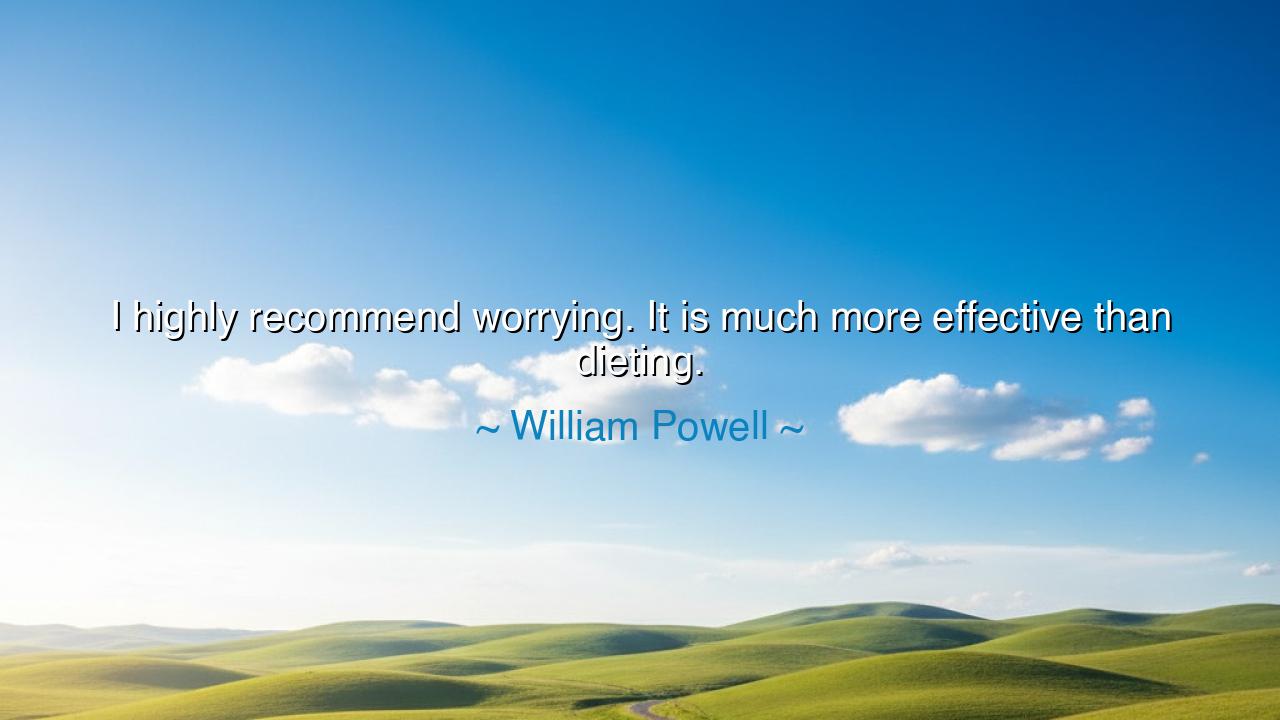
I highly recommend worrying. It is much more effective than






"I highly recommend worrying. It is much more effective than dieting." These words, uttered by the sage William Powell, carry a weight that may first appear light, yet it speaks to a deep and profound truth about the human condition. We, in our ceaseless striving for perfection, often turn to the ephemeral and fleeting solutions of the world, whether through dieting or endless pursuit of physical beauty. Yet Powell’s words remind us that the greater battle is not won through the outward changes we seek, but through the inner trials of the soul. Worrying, he suggests, though not the path to peace, holds a certain effectiveness—it exposes our vulnerability and the real nature of our struggles.
In the ancient world, the wise elders spoke often of the tension between the body and the spirit. The body, with its desires and appetites, is ever the battleground for the soul’s will. It is easy to be consumed by the physical, to obsess over the nourishment of the body and the fleeting appearance of strength. Yet, those who truly sought wisdom knew that the more persistent battle was the one within—the battle of the mind. Worrying, while seen as a curse, is a reflection of the mind’s deep engagement with life’s mysteries, its fears, and its uncertainties. When one is wrapped in worry, they are, in a sense, facing the challenges that life throws at them. It is a paradox, for the very act of worry can sometimes sharpen the mind, forcing it to confront what it might rather ignore.
Consider the example of the great Socrates, who was plagued by worry throughout his life. Though his wisdom transcended that of most, it was not without great personal cost. He was often tormented by the fear that his quest for knowledge might lead to a deeper understanding of the limitations of human existence. He worried about the impact of his teachings on his city, knowing that such knowledge could bring unrest. His very concerns led him to challenge not just his society but himself, to face the inner conflict that burns in all of us. Worry, for Socrates, was a means of sharpening his intellect and refining his purpose. It was his way of engaging with the world more deeply, knowing that without such struggle, there would be no true growth.
And yet, let us not be deceived. Powell’s words carry a warning. The act of worrying, though effective in some sense, is not the answer to life’s tribulations. For to worry without purpose is to be consumed by that which we cannot control. Dieting may be a symbol of our obsession with the physical, but worrying is the mirror of our obsessions with the intangible. It is a futile loop, a trap, where we circle endlessly around the unknown, seeking to master the uncontrollable. The wise ones knew that one must strike a balance—worry can be a tool for reflection, but it must not become the master of the mind. As the great Confucius once said, “He who learns but does not think, is lost; he who thinks but does not learn is in great danger.” We must find the wisdom to use worry, not to be enslaved by it.
In every age, great leaders have faced the struggle of worry—be it over the fate of their people, the future of their nation, or the outcomes of their actions. Winston Churchill, that mighty figure of history, was known to suffer from moments of deep despair and worry during the darkest days of war. Yet, it was not his worries that defined him, but his ability to act despite them. He did not allow worry to paralyze him; rather, he used it as fuel to lead his people. His worry was a reflection of his deep care, his unrelenting desire to see his nation through the storm. He, too, was a man of paradox: a man of great courage, yet often weighed down by the burden of what might happen.
And so, we must learn the deeper lesson Powell speaks of. Worry, in its own way, can be effective, but only when it serves as a catalyst for action, not inaction. It is the fire that sparks the forging of the sword but must not become the flame that consumes the forge. To worry is to acknowledge the unseen forces of the world, but one must also know how to act in the face of that uncertainty. True wisdom comes when we learn to balance worry with action, to move forward despite our fears and doubts.
I implore you, noble reader, to take this truth to heart. Worry may come to you unbidden, but do not let it rule you. Let it be a call to action, a reminder that you must face the challenges ahead. Do not be content merely with the outward pursuit of perfection—whether in dieting or in the quest for physical form—without first confronting the deeper worries of the soul. Let your worries lead you to action, to reflection, and to the understanding that life is never just one or the other, but a balance of the physical and the mental, the known and the unknown. The struggle is not in the worrying, but in how you choose to wield it.






AAdministratorAdministrator
Welcome, honored guests. Please leave a comment, we will respond soon